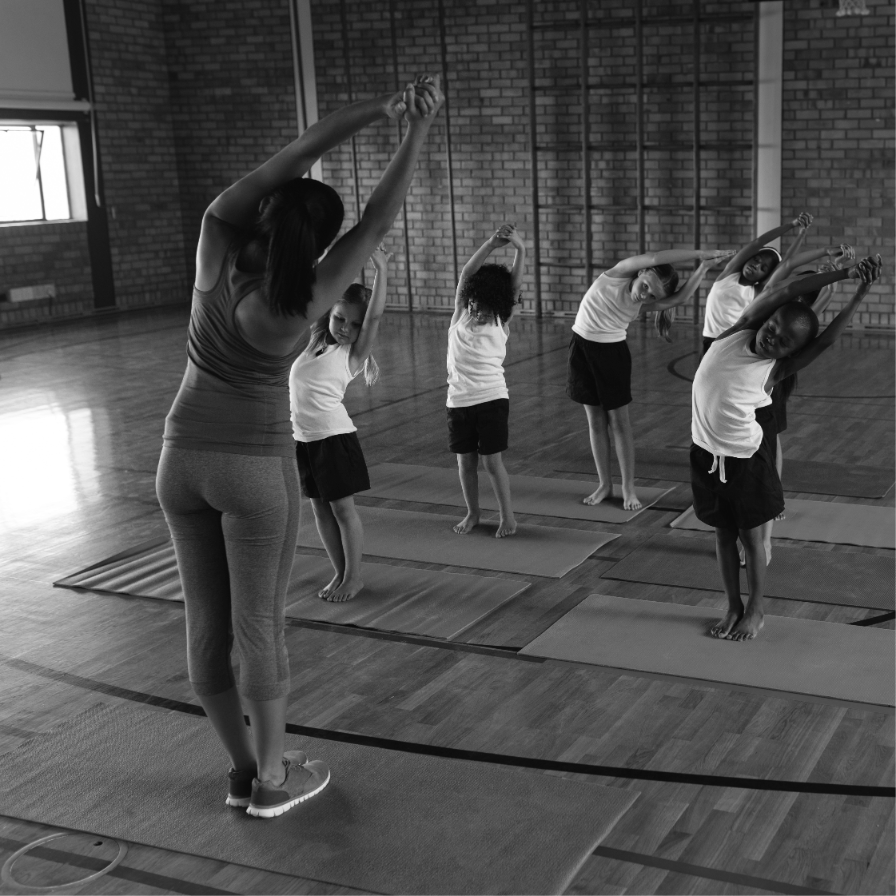Yoga in the Classroom

Below is a short description of our different yoga-based resources. Scroll down to read a summary of some of the research-based benefits of practising yoga in the classroom.
Posters
Our downloadable yoga posters are designed for you to print and display in your classroom. Each poster includes some top tips for practising yoga with your class, as well as a description of each pose and suggested timings.
Games and Resources
Designed to enhance positive relationships within the class and generate positive emotions, our yoga games are fun for all ages.
Benefits of Yoga in the Classroom
Although the study of classroom-based yoga is in its infancy, research to date shows that practising yoga has a number of benefits for school-aged children. Regular yoga practice can have a protective or preventive role in maintaining mental health and can also improve wellbeing.
It’s interesting to note that a number of studies cite the importance of seeing classroom-based yoga practices as complementary to social and emotional learning activities, rather than as a stand-alone programme. Therefore, it is our hope that using our yoga-based resources in conjunction with PEEC will further improve the wellbeing of the teachers and students within our PEEC Community.
Increased Emotional Regulation
Studies have shown that regularly engaging in yoga practices improves students’ ability to regulate their emotions. In fact, research suggests that mindful yoga practices are of greater benefit regarding emotional self-regulation than mindfulness practices alone.
It’s also interesting to note that students who are most at risk of self-regulation dysfunction may benefit the most from mindfulness-based yoga practices.
Reduced Stress and Anxiety
A systematic review of yoga interventions showed that students experience reduced anxiety after engaging in yoga. Research also suggests that yoga has a positive impact on students’ problematic responses to stress, such as repetitive negative thoughts and strong, intrusive emotions.
Enhanced Academic Achievement
Studies show that practising yoga improves students’ memory and attention; and alleviates academic stress, all of which lead to improved academic outcomes.
Greater Resilience
Research shows that yoga practice can develop students’ resilience due to improvements in their sense of control and self-efficacy with respect to stress and emotion.
Decreased Behavioural Problems
Results from a study that measured cortisol levels suggest that school-based yoga could aid students’ ability to manage stress and help to improve students’ behaviour.
One study found that regularly engaging in yoga resulted in decreased incidence of bullying among primary-aged children. Studies involving secondary-aged students show that regular yoga practices result in fewer absences and detentions.
Improved Physical Wellbeing
It comes as no surprise that studies have shown that practising yoga has a positive impact on students’ physical wellbeing. Engaging in regular yoga practices improves children’s strength, balance, flexibility, endurance and aerobic capacity.
Enhanced Teacher Wellbeing
Last, but certainly not least, engaging in yoga practices has a positive impact on teacher wellbeing. Studies show that regularly practising yoga results in improved mindfulness, positive mood and classroom management as well as lower blood pressure and levels of cortisol.
References
Bazzano, A. N., Anderson, C. E., Hylton, C., & Gustat, J. (2018). Effect of mindfulness and yoga on quality of life for elementary school students and teachers: results of a randomized controlled school-based study. Psychology research and behavior management, 11, 81–89.
Bergen-Cico, D., Razza, R. & Timmins, A. Fostering Self-Regulation Through Curriculum Infusion of Mindful Yoga: A Pilot Study of Efficacy and Feasibility. Journal of Child and Family Studies, 24, 3448–3461.
Berger, D.L., Silver, E.J. & Stein, R.E. (2009). Effects of yoga on inner-city children’s well-being: a pilot study. Alternative Therapies in Health and Medicine, 15(5), 36-42.
Butzer, B., Day, D., Potts, A., Ryan, C., Coulombe, S., Davies, B., Weidknecht, K., Ebert, M., Flynn, L., & Khalsa, S. B. (2015). Effects of a classroom-based yoga intervention on cortisol and behavior in second- and third-grade students: a pilot study. Journal of evidence-based complementary & alternative medicine, 20(1), 41–49.
Centeio, E.E., Whalen, L., Thomas, E., Kulik, N. & McCaughtry, N. (2017). Using Yoga to Reduce Stress and Bullying Behaviors among Urban Youth. Health, 9, 409-424.
Conboy, L.A., Noggle, J.J., Frey, J.L., Kudesia, R.S. & Khalsa, S.B.S. (2013). Qualitative Evaluation of a High School Yoga Program: Feasibility and Perceived Benefits. Explore, 9(3), 171-180.
Daly L.A., Haden S.C., Hagins M., Papouchis N. & Ramirez, P.M. (2015). Yoga and Emotion Regulation in High School Students: A Randomized Controlled Trial. Evidence-Based Complementary and Alternative Medicine.
D’souza C. & Avadhany S.T. (2014). Effects of yoga training and detraining on physical performance measures in prepubertal children–a randomized trial. Indian Journal of Physiology and Pharmacology, 58(1), 61-68.
Folleto, J.C., Pereira, K.R.G., & Valentini, N.C. (2016). The effects of yoga practice in school physical education on children’s motor abilities and social behaviour. International Journal of Yoga, 9(2), 156-162.
Frank, J.L., Bose, B. & Schrobenhauser-Clonan, A. (2014). Effectiveness of a School-Based Yoga Program on Adolescent Mental Health, Stress Coping Strategies, and Attitudes Toward Violence: Findings From a High-Risk Sample. Journal of Applied School Psychology, 30(1), 29-49.
Frank, J.L., Kohler, K., Peal, A.& Bidyut, B. (2017). Effectiveness of a School-Based Yoga Program on Adolescent Mental Health and School Performance: Findings from a Randomized Controlled Trial. Mindfulness, 8, 544–553.
Hagins, M., Rundle, A. (2016). Yoga Improves Academic Performance in Urban High School Students Compared to Physical Education: A Randomized Controlled Trial. Mind, Brain and Education, 10(2), 105-116.
Khalsa, S.B.S., Hickey-Schultz, L., Cohen, D., Steiner, N. & Cope, S. (2012). Evaluation of the Mental Health Benefits of Yoga in a Secondary School: A Preliminary Randomized Controlled Trial. Journal of Behavioral Health Services & Research, 39,80–90.
Harris, A.R., Jennings, P.A., Katz, D.A. Abenavoli, R.M. & Greenberg, M.T. (2016). Promoting Stress Management and Wellbeing in Educators: Feasibility and Efficacy of a School-Based Yoga and Mindfulness Intervention. Mindfulness, 7, 143–154.
Mendelson, T., Greenberg, M. T., Dariotis, J. K., Gould, L. F., Rhoades, B. L., & Leaf, P. J. (2010). Feasibility and preliminary outcomes of a school-based mindfulness intervention for urban youth. Journal of abnormal child psychology, 38(7), 985–994.
Nanthakumar, C. (2018). The benefits of yoga in children. Journal of Integrative Medicine, 16(1), 14-19.
Noggle, J.J., Steiner, N. J., Minami, Takuya, Khalsa, S.B.S. (2012). Benefits of Yoga for Psychosocial Well-Being in a US High School Curriculum: A Preliminary Randomized Controlled Trial. Journal of Developmental & Behavioral Pediatrics, 33(3), 193-201.
Razza, R.A., Bergen-Cico, D. & Raymond, K. (2015). Enhancing Preschoolers’ Self-Regulation Via Mindful Yoga. Journal of Child Family Studies, 24, 372–385.
Sarkissian, M., Trent, N.L., Huchting,., Singh Khalsa, S.B. (2018). Effects of a Kundalini Yoga Program on Elementary and Middle School Students’ Stress, Affect, and Resilience. Journal of Developmental & Behavioral Pediatrics, 39(3), 210-216.
Velásquez,A.M., López, M.A., Quiñonez, N. & Paba, D.P. (2015). Yoga for the prevention of depression, anxiety, and aggression and the promotion of socio-emotional competencies in school-aged children, An International Journal on Theory and Practice, 21(5-6).
Weaver, L. L., & Darragh, A. R. (2015). Systematic Review of Yoga Interventions for Anxiety Reduction Among Children and Adolescents. The American journal of occupational therapy : official publication of the American Occupational Therapy Association, 69(6), 9.
Disclaimer
Yoga provides great benefits, but only you know your own body and limits. Like any exercise, please consult your health care professional with any questions or concerns before starting any exercise program. When participating in any exercise or exercise program, there is the possibility of physical injury. Not all exercises on our website are suitable for all persons. The creators of PEEC, which includes all lessons, posters, videos, classes, programs, marketing materials, and all accompanying materials are not liable for any injury, accident, or health impairment befalling and viewer of these programs, or any individual utilising the techniques suggested in our posters, videos, lessons and resources. PEEC and The Institute of Positive Education are not licensed medical care providers and represent that it has no expertise in diagnosing, examining or treating medical conditions of any kind, or in determining the effect of any specific exercise on a medical condition. PEEC and The Institute of Positive Education make no representations or warranties with regards to the completeness of information on this website or any linked websites, classes, books, posters, videos or other products represented herein.




